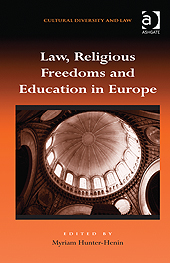Law, Religious Freedoms and Education in Europe

Law, Religious Freedoms and Education in Europe
Edited by Myriam Hunter-Henin, University College London, UK
Ashgate 2012
This collection considers how contemporary cultural and religious diversity challenges and redefines national constitutional and legal frameworks and concepts, within the context of education. It offers a critical reflection on the extent and meanings given to religious freedom in education across Europe. The contributions deal primarily with Western Europe although the book also includes a study of the US vibrant debates on Creationism.
This volume considers issues such as religious expression, faith schooling and worship in schools, in a multidisciplinary and comparative approach. The book first examines key concepts, before presenting national models of religion and education in Europe and analyzing case studies relating to religious symbols worn at school and to the teaching of religious education.
Legal questions are examined in a wider context, in the light of the intentions of state policy and of current national and transnational debates. Controversies on the legal implications of personal and national identities are for example analyzed. From a comparative perspective, the chapters examine the possible converging power of human rights and anti-discrimination discourses and reveal the difficulties and risks involved in seeking to identify the best model for Europe.
This topical study of a highly sensitive area of education presents a valuable insight for students, researchers and academics with an interest in cultural and religious diversity, human rights and education.
Contents:
Foreword, Robert Jackson;
Preface, Myriam Hunter-Henin;
Introduction: religious freedoms in European schools: contrasts and convergence, Myriam Hunter-Henin;
Part I Key Concepts: Laïcité, Integration, Identity and Discrimination: The classroom as a tolerance lab, Lorenzo Zucca; Jewish day schools in France: mapping their Jewish identity proposals, Martine Cohen; Having faith in our schools: struggling with definitions of religion, Arif A. Jamal and Farid Panjwani; Religious discrimination and schools: the employment of teachers and the public sector duty, Lucy Vickers.
Part II National Models: Religion, regionalism and education in the United Kingdom: tales from Wales, Russell Sandberg and Anna Buchanan; Religion and education in Northern Ireland: voluntary segregation reflecting historical divisions, Christopher McCrudden; The French model: tensions between laïc and religious allegiances in French state and Catholic schools, Blandine Chélini-Pont; Religious education in a religiously neutral state: the German model, Heinrich de Wall; The controversy surrounding the denominational teaching of religion in Spanish state schools, Javier García Oliva.
Part III Case Studies: The Influence of Religion on Teaching Content and School Ethos: Religious education in Europe in the 21st century, Peter Cumper; Religious education and religious liberty: opt-outs and young people’s sense of belonging, Alison Mawhinney, Ulrike Niens, Norman Richardson and Yuko Chiba; History textbooks within the framework of the French laïcité, Anna Van den Kerchove; Teaching evolution, creationism, and intelligent design in US schools (with some European comparisons), Eric Barendt; Beating people is wrong: Campbell and Cosans, Williamson and their aftermath, Frank Cranmer.
Part IV Case Studies: Religious Symbols at School: Bracelets, rings and veils: the accommodation of religious symbols in the uniform policies of English schools, Mark Hill; A uniform approach to religious discrimination? The position of teachers and other school staff in the UK, Russell Sandberg; Of crucifixes and headscarves: religious symbols in German schools, Tobias Lock;
Index.
About the Editor: Myriam Hunter-Henin joined the Faculty of Laws, UCL, in September 2003. She was formerly a researcher and lecturer at Paris I (Pantheon-Sorbonne). Her main interests are Comparative Law, Family Law, Law and Religion, Private International Law and Bioethics. Her work addresses the implications of human rights in the private sphere, especially the challenges posed to the legal theory of Conflict of Laws and to traditional concepts of family law such as marriage and motherhood. It also addresses the interaction and tensions between law and religion in the sphere of education and family law in a comparative perspective. She is currently Deputy Director for the Faculty’s various international programmes and Director of the European Double Degree Programmes. She is also a Fellow of the Comité français de droit international privé in Paris, France, and co-director of the Institute of Global law .